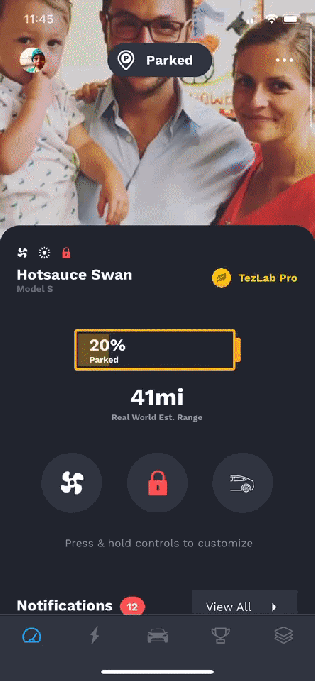Tesla owners can now see how much solar or coal is powering their EVs
Tesla owners can now see exactly what kind of energy is powering their electric vehicles. TezLab, a free app that's like a Fitbit for a Tesla vehicle, pushed out a new feature this week that shows the energy mix - breaking down the exact types and percentages of fossil fuels and renewable energy - coming from charging locations, including Superchargers and third-party networks throughout the United States.
We're tracking the origin of data as it relates to energy, so we know if you're in Tucson or Brooklyn (or any location) where the energy is coming from and what the mix of that energy looks like," Ben Schippers, the CEO and co-founder of TezLab explained in a recent interview. As a result, we can see how much carbon is being pushed out into the atmosphere based on your charge, whether you're charging at home, or whether you're charging at a Supercharger."
ElectricityMap, a project from Tomorrow, provided the energy data, which TezLab then folded into its consumer-facing app. Once downloaded, the app knows when and where a Tesla owner is plugging in. The energy mix feature builds off of an existing program on the app that gave owners more general information on how dirty or clean their charge is.

Image Credits: TezLab
Take Tesla's Linq High Roller Supercharger in Las Vegas, a V3 Supercharger that is supposed to support a peak rate of up to 250 kilowatts and has been heralded for its use of Tesla solar panels and its Powerpack batteries to generate and store the power needed to operate the chargers.
According to TezLab's data, 1.7% of the energy is from solar. The primary source of renewable energy is actually hydro at 65.6% - courtesy of the Hoover Dam. The remaining energy mix from the Supercharger is about 33% natural gas.
Tesla's Supercharger in Hawthorne, California, which was one of the first to have solar panels, has an energy mix of 0.2% solar, 5.5% nuclear,13.3% natural gas, 27% coal and 49.9% wind.
The top 10 cleanest" Superchargers - a list that includes Centralia, Leavenworth, Moses Lake and Seattle, Washington - achieved that goal thanks to hydroelectric power. Superchargers with the most solar energy are all located in the same power grid in California. Superchargers in Barstow, Oxnard, Cabazon, San Diego, Mojave, Inyokern, San Mateo, Seaside and Santa Ana, California all have 22.7% solar and 15% wind energy. The remaining mix at these locations is 0.2% battery storage, 2.9% biomass, 5.6% geothermal, 6.3% hydro, 6.6% nuclear and 40% natural gas.
TezLab was born out of HappyFunCorp, a software engineering shop that builds apps for mobile, web, wearables and Internet of Things devices for clients that include Amazon, Facebook and Twitter, as well as an array of startups. HFC's engineers, including co-founders Schippers (who is now chairman of the company's board) and William Schenk, were attracted to Tesla largely because of its software-driven approach. The group was particularly intrigued at the opportunity created by the openness of the Tesla API. The Tesla API is technically private. But the endpoints are accessible to outsiders. When reverse-engineered, it's possible for a third-party app to communicate directly with the API.
TezLab launched in 2018 with some initial features that let owners track their efficiency, total trip miles and use it to control certain functions of the vehicle, such as locking and unlocking the doors and heating and air conditioning. More features have been added, mostly focused on building community, including one that allows Tesla owners to rate Supercharger stations.
All of that data is aggregated and anonymous. TezLab has said it won't sell that data. It does post on its website insights gleaned from that data, such as a breakdown of model ownership, the average trip length and average time between plugging in.
As other electric vehicles come to market, TezLab is adding those to the app, including the Ford Mustang Mach-E.
Giving EV batteries a second life for sustainability and profit